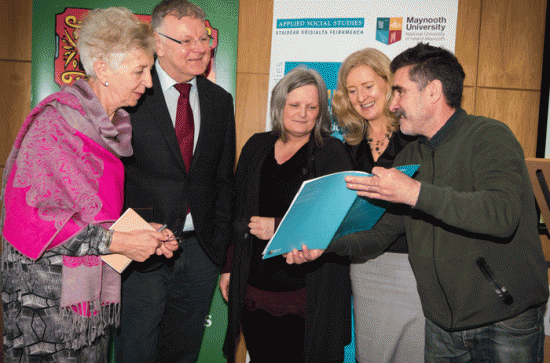
A new report launched today at Maynooth University calls for action on the low levels of participation in higher education among Irish Travellers. The “Travellers in Higher Education” report is based on consultation with more than 30 stakeholders, including Traveller graduates, and addresses the opportunities and barriers that Travellers face in accessing higher education while also setting out a roadmap for supporting better access.
The persistent inequality in access to and participation in education between Travellers and the general population has long been documented. 55% of Travellers leave school by the age of 15 and 90% of travellers have finished education by the age of 17. The Higher Education Authority observed that Travellers comprised an estimated 0.1% of new entrants in 2015, and that there was a total of 35 travellers enrolled in higher education.
Over the past 30 years, Maynooth University has led efforts to build Traveller participation in university education in particular through programmes offered by the Department of Applied Social Studies. Over this period, 25 Travellers have graduated from Maynooth University with academic and professional qualifications at degree and postgraduate level.
Speaking at the launch of the report, Anastasia Crickley, former Head of Maynooth University Department of Applied Social Studies and President of the UN Committee for the Elimination of Racism and Discrimination (CERD), noted: “Maynooth has played a leading role in bringing Travellers into higher education in Ireland. The University is a role model within the higher education sector in developing good practice for inclusion, and this report sets out the next steps to build upon this role.”
The report calls for the establishment of targets and quotas for students and staff, the review of existing access strategies to assess their impact on Traveller access, and the appointment of a dedicated support worker for Travellers who will engage with and support existing students, potential students, and their families.
The report places particular emphasis on mature students, because of the particular challenges of re-entering formal education in early adult life for many Travellers. Many of participants in the Maynooth Applied Social Studies programme could only participate in higher education when they no longer had to be principally concerned with childcare.
As Crickley notes: “The 26-40 age group has a richness of experience to bring to student life, and can be powerful role models and potential leaders within their communities. The initiatives we are proposing will come with challenges, but they will ultimately enrich the University community and must be regarded as an asset in the pursuit of a just and fair society.”
Please see full report: Access report - Maynooth University
